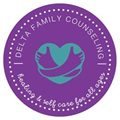EMDR.
What if you woke up one day and your traumatic or distressing memories and events did not have control over your life anymore, instead you had control over them?
Welcome to EMDR
When complicated, bad, yucky, unsafe events happen to a person the brain can have a hard time processing and making sense of all of the information about what has happened. EMDR can help a person make sense of all of the information that has become jumbled in the body and brain due to these events.
EMDR also known as Eye Movement Desensitization and Reprocessing is a form of trauma therapy. The goal of EMDR is to help reprocess and rewire a person’s brain to learn and utilize new ways of thinking and coping with traumatic and distressing events or memories a person has experienced.
EMDR utilizes bilateral stimulation (using the left and right side of the brain and body at the same time) which helps the brain begin to rewire itself. In turn, rewiring the brain helps the person to better cope and process the traumatic events that have occurred in a safe way.
What makes EMDR different from other types of therapies you ask?
EMDR is not a one-size-fits-all approach! EMDR can be modified and administered in several different ways to meet the needs of every person individually. Something pretty cool about EMDR is it is not like your typical talk therapy way of doing counseling. You don’t even have to talk about the trauma while engaging in EMDR if you don’t want to. EMDR allows you to process the trauma or distress in an empowering way and environment.
Who can benefit from EMDR?
The short answer is everyone and anyone. EMDR can be utilized with adults and even children and teens. This is part of the reason why it is so flexible for each individual person to meet their needs.
EMDR is great for working with Trauma however it can also be utilized but not limited to concerns such as:
- Anxiety
- Depression
- Addiction
- OCD
- Intense Feelings
- Dissociation
- Self-esteem
- Bullying
- Abuse/Neglect
- Grief and loss
- Abandonment
- Attachment concerns.


